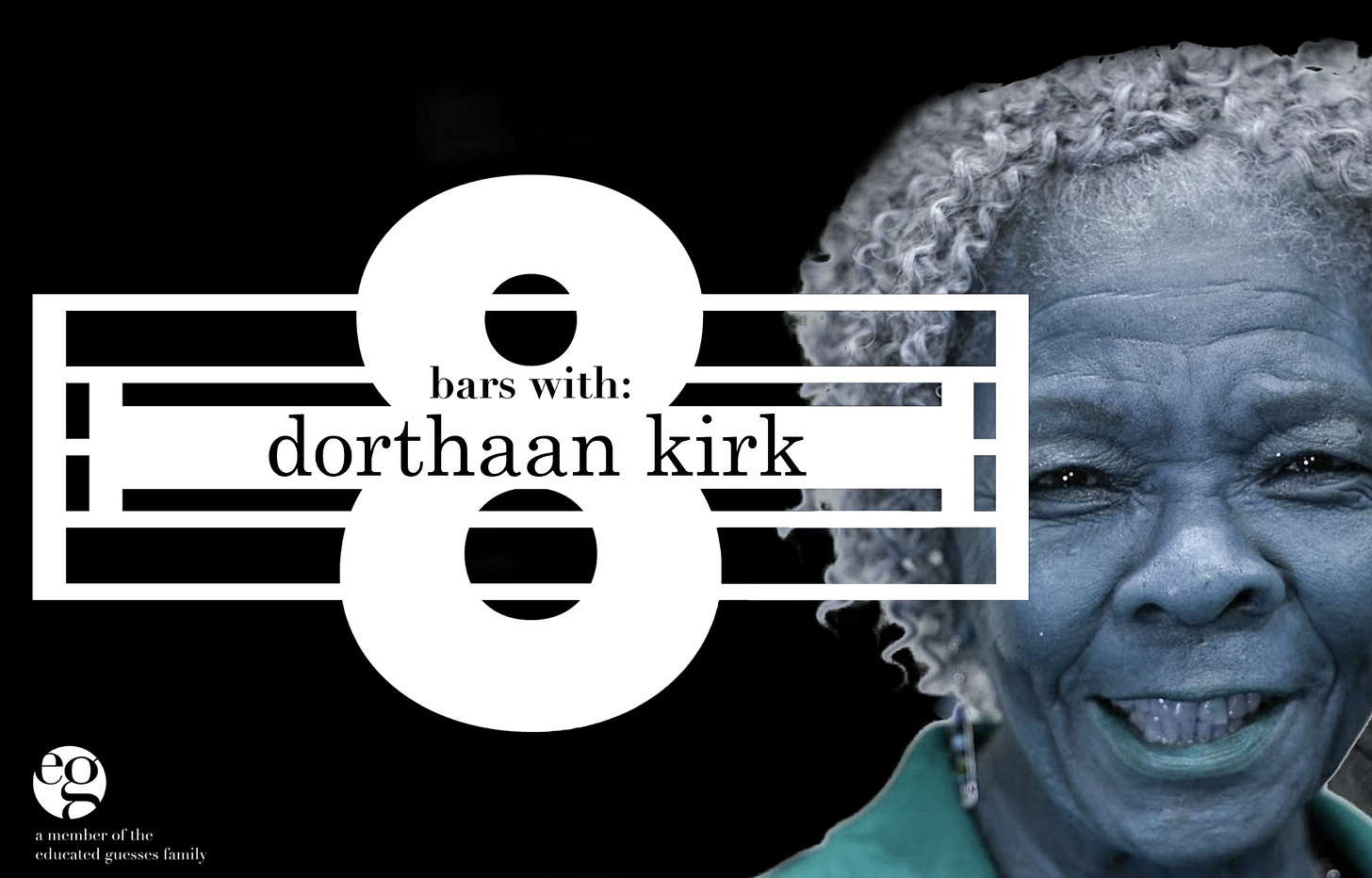8 bars with dorthaan kirk
Our guest is jazz advocate and NEA Jazz Master Dorthaan Kirk.
8 bars with, is a series on educated guesses where we offer up 8 questions to a special guest for them to ponder and freestyle on. The questions aren't necessarily questions as much as they are prompts or linguistic ink blots meant to stimulate thought. The responses can be short and pithy, long and loquacious or somewhere in between.
83 year-old, Texas-born, Dorthaan Kirk - widow of legendary saxophonist/multi-instrumentalist Rahsaan Roland Kirk - was a mainstay at Newark’s WBGO-FM, mostly as the Special Events and Community Relations Coordinator, from 1978 to 2018. Known as Newark’s “First Lady of Jazz,” she was the recipient of the 2020 A.B. Spellman NEA Jazz Masters Fellowship for Jazz Advocacy for her four decades as a curator and producer of jazz events, and for her role as an avid supporter of musicians and jazz education.
1. NEA Jazz Master?
It’s still hard to get over the fact that I was chosen. It’s the highest honor you can receive in jazz. I didn't do the things that I did for recognition. I did them for the community, because it was part of my job. I love all of those things that I did. So when I get acknowledged, I guess it overwhelms me.
2. WBGO’s origin?
WBGO started when [founder] Bob Ottenhoff wrote the paper that transferred the license of the station from the Newark Board of Education to Newark Public Radio. Since New Jersey didn't have a public radio station at the time, he thought that a station with the format of news, jazz and public affairs would be beneficial to New Jersey, since New York had its own commercial jazz radio station that at the time.
3. WBGO’s Sound?
We've had three program directors: Al Pryor, Wylie Rollins, and the late Thurston Briscoe. And Steve Williams is the new President and CEO. WBGO has stayed true to its original mission: to feature mainstream, straight-ahead, jazz, which was our mandate to the FCC. It seems to me that the direction they're going in now, is to create a sound that still features mainstream jazz artists, intertwined with artists like Grover Washington, Jr.
4. The unknown Rahsaan Roland Kirk?
He hated Braille, even though he used it from time to time.
5. Dorthaan’s Place?
In 2011, John Schreiber, President/CEO of New Jersey Performing Arts Center (NJPAC) wanted to have more jazz at the center. And I was one of several prominent people he spoke to in the jazz community when he created the TD James Moody Jazz Festival. So the Development Director, Peter Hanson, came up with the name, Dorthaan’s Place. He thought having a jazz brunch at NJPAC would attract people from the community. They did five brunches per year, with the kickoff always being part of the jazz festival.
6. Bethany Baptist Church Jazz Vespers?
I became a member of Bethany in Newark in 1991. Pastor William Moses Howard came up with the concept to have a jazz Vespers service, when he came to Bethany in 2000, because the Saturday service wasn't very well attended. It's presented every first Saturday at six o'clock. And it usually ends around 7:30pm. He went up against a lot of opposition because jazz isn't heard up in a Baptist Church. So he invited the congregation to go to St. Peter's Church in New York, to observe a Jazz Vespers service. The congregation saw that it's actually a church service with music like, Duke Ellington’s “Come Sunday.” Nobody could say that’s “The Devil's music,” right?
7. Creating Jazz at Lincoln Center?
There was a woman named Alina Bloomgarden, who worked in visitor services for Lincoln Center. She did things like Mozart suppers, and she wanted to present jazz when Alice Tully Hall was dark in the summertime. She wanted WBGO to promote her idea, and she wanted me to be her associate producer, because she didn't know one jazz musician from the other one. She asked Wynton Marsalis to put his stamp of approval on it, which he did, as artistic director. That first year [of concerts] was dedicated to women. And that’s how Jazz at Lincoln Center started.
8. The jazz scene?
Duke Ellington, Miles Davis, Dexter Gordon, and Carmen McCrae, sound just as good today, as they did way back then. The Bebop generation is going to be around. Now I can’t predict the future, but I don't see those followers of Kumasi Washington - whom I like - still playing him thirty years from now. That’s kind of how I see it. It doesn't make it true, but that's how I feel.
Bonus Question:
Fountain of youth?
Some days I feel 125, so I can't I can't answer that [laughs]. I think maybe it's because I have remained active all my life. I have all kinds of friends, different age groups. I know a ton of young people. They call me Nana. I'm constantly involved with technology, and that probably helped a lot.



I like this!
Wonderfully enthusiastic voice and heart …